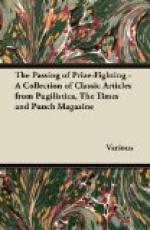“‘Well, Reggie,’” she said.
“I looked at her kindly but firmly.
“‘I think there is some mistake,’ I said. ’I don’t remember having met you.’ Then I pointed to my bandaged head, and added, ’I may have forgotten. My memory isn’t very good.’
“Well, she chatted a bit about general subjects, and then departed. I don’t mind saying I felt rather a worm. Also I wasn’t quite sure that Dulcie couldn’t bring out more that was good in me than Daphne, after all. So I thought about it a bit, and then wrote and said I’d remembered her now, and would she come again to see me? She wrote back and said she would, and I must congratulate her as she was just engaged to be married. That was a rotten day, I remember, because in the afternoon Daphne came and said that she was engaged to be married too. A perfect epidemic. But that’s beside the point.”
“The point was, if I remember rightly,” said Cotterell, “that it’s a great advantage to have your head bandaged. Have you quite proved it?”
“No,” said Spilbury thoughtfully. “Now you mention it, I hardly think I have. But if my story acts as an example and a warning I shall be satisfied.”
So as an example and a warning (though of what or to whom is not too clear) I have recorded it.
* * * * *
Musical MURMURINGS.
(BY OUR ORCHESTRAL EXPERT.)
The full programme for the season of Promenade Concerts which opened last Saturday is, as usual, a most interesting document, and we are of course glad to see that our gallant Allies are so well represented. But it is the function of the critic to criticise, and we may be permitted to express a mild regret that our native school, though by no means excluded, does not make so good a show as its energy and talents would seem to warrant. Our native composers are especially noticeable for their wide range of themes, for the Celtic and Gaelic glamour which they infuse into their treatment of them, and for their realistic titles. We have drawn up a list of instrumental works which illustrate these characteristics, but which are unfortunately conspicuous by their absence from Sir Henry wood’s scheme. As, however, it is subject to alteration we are not without the hope that some of them may yet be included in the list of works to be heard at the Queen’s Hall in the next six weeks.
Symphonic variations. “Father’s
lost his collar-stud.” Hans
Halfburn.
KELTIC KORONACH. “Wirrasthrue.” Seumas Macdthoirbwlch.
Funeral March of A conscientious objector. Nelson Wellington.
SIAMESE LULLABY for Sixteen Trombones. Quantock de Banville.
FANTASIA. “Wardour Street.” Yokeling Ffoulkes.
MANX MEDITATION for Revolving Orchestra. “Laxey
Wheel.” Bradda
Quellyn.




